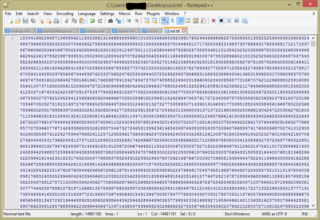The email about watching all the possible frames in a 1080 screen on this weeks podcast drove me to crunching some numbers.
No one has corrected me on my stupid errors yet. Good. It should of course be 2^24^(1920*1080) which is 2^49766400, a number so large no software I have can process it. Sorry for the previously optimistic results. Trillions turned out to be way, way too low. As for time, I suspect the universe will have ended before you are done watching the whole thing, regardless of framerate.
If we assume 24-bit color depth, that is 16 777 216 possible colors for a single pixel, and a screen of 1080x1920 pixels, the total number of combinations of these pixels is 2^24*1080*1920. Which equals approximately 3.47*10^13 frames, or 34.7 trillion.
This means that watching the past, present, and future in glorious HD-quality would take about 1.1 million years, if watching one frame per second.
Reducing the color depth, or, as mentioned, reducing the resolution will obviously have a dramatic effect on this number. 8-bit colordepth frames at 560x720 will only take about 3 years and 3 months. Although 256 colors don't describe the real world very well, so don't think you have seen it all just because you did this stupid stupid thing.
If anyone is noticing any errors in these calculations feel free to correct me. I'm NOW pretty confident in these numbers, but I do make mistakes occasionaly.


Log in to comment